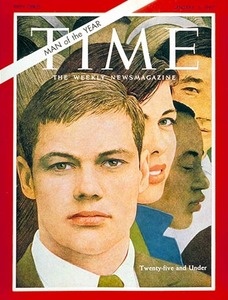Fact #145023
When:
Short story:
 A feature in Time magazine in the USA examines the phenomenon now being called The Generation Gap, declaring, "The young have already staked out their own mini society, a congruent culture that has both alarmed their elders and, stylistically at least, left an irresistible impression on them."
A feature in Time magazine in the USA examines the phenomenon now being called The Generation Gap, declaring, "The young have already staked out their own mini society, a congruent culture that has both alarmed their elders and, stylistically at least, left an irresistible impression on them."Full article:
The young have already staked out their own mini society, a congruent culture that has both alarmed their elders and, stylistically at least, left an irresistible impression on them. No Western metropolis today lacks a discotheque or espresso joint, a Mod boutique or a Carnaby shop. No transistor is immune from rock 'n' roll, no highway spared the stutter of Hondas. There are few Main Streets in the world that do not echo to the clop of granny boots, and many are the "grannies" who now wear them. What started out as distinctively youthful sartorial revolt - drainpipe-trousered men, pants-suited or net-stockinged women, long hair on male and female alike - has been accepted by adults the world over.
The young seem curiously unappreciative of the society that supports them. "Don't trust anyone over 30," is one of their rallying cries. Another, "Tell it like it is," conveys an abiding mistrust of what they consider adult deviousness.
Sociologists and psychologists call them "alienated" or "uncommitted." In fact, the young today are deeply involved in a competitive struggle for high grades, the college of their choice, a good graduate school, a satisfactory job - or, if need be, for survival in Vietnam. Never have they been enmeshed so early or so earnestly in society. Yet they remain honestly curious and curiously honest.
Despite their tolerance of quixotic causes and idiosyncratic roles, the young reflect--more accurately than they might care to admit--many of the mainstream currents in society at large. In 1966, the young American became vociferously skeptical of the Great Society. Though he retains a strong emotional identification with the deprived and spurned citizens of his own and other societies, he recognizes that the civil rights revolution, in which he was an early hero at the barricades, has reached a stage at which his own involvement is no longer vital. And, as a letter to the President signed by 100 student leaders across the nation showed last week, he has become increasing perturbed by the war.
(Source : Time magazine, Jan 6, 1967)
Tweet this Fact
The young seem curiously unappreciative of the society that supports them. "Don't trust anyone over 30," is one of their rallying cries. Another, "Tell it like it is," conveys an abiding mistrust of what they consider adult deviousness.
Sociologists and psychologists call them "alienated" or "uncommitted." In fact, the young today are deeply involved in a competitive struggle for high grades, the college of their choice, a good graduate school, a satisfactory job - or, if need be, for survival in Vietnam. Never have they been enmeshed so early or so earnestly in society. Yet they remain honestly curious and curiously honest.
Despite their tolerance of quixotic causes and idiosyncratic roles, the young reflect--more accurately than they might care to admit--many of the mainstream currents in society at large. In 1966, the young American became vociferously skeptical of the Great Society. Though he retains a strong emotional identification with the deprived and spurned citizens of his own and other societies, he recognizes that the civil rights revolution, in which he was an early hero at the barricades, has reached a stage at which his own involvement is no longer vital. And, as a letter to the President signed by 100 student leaders across the nation showed last week, he has become increasing perturbed by the war.
(Source : Time magazine, Jan 6, 1967)